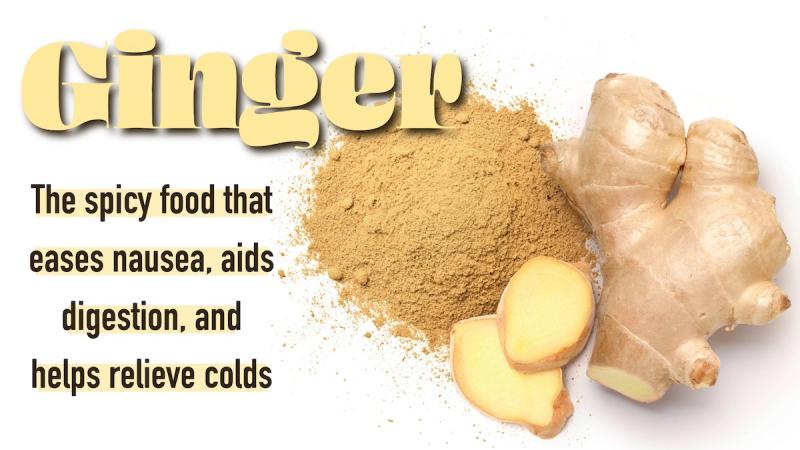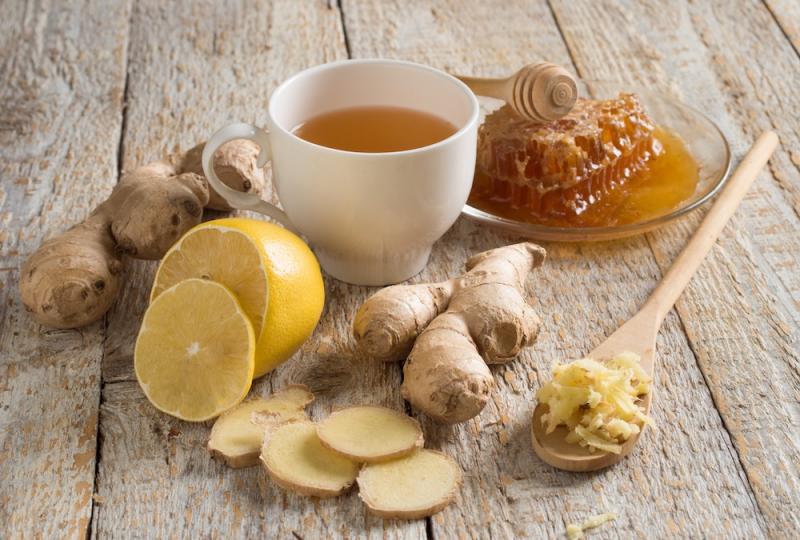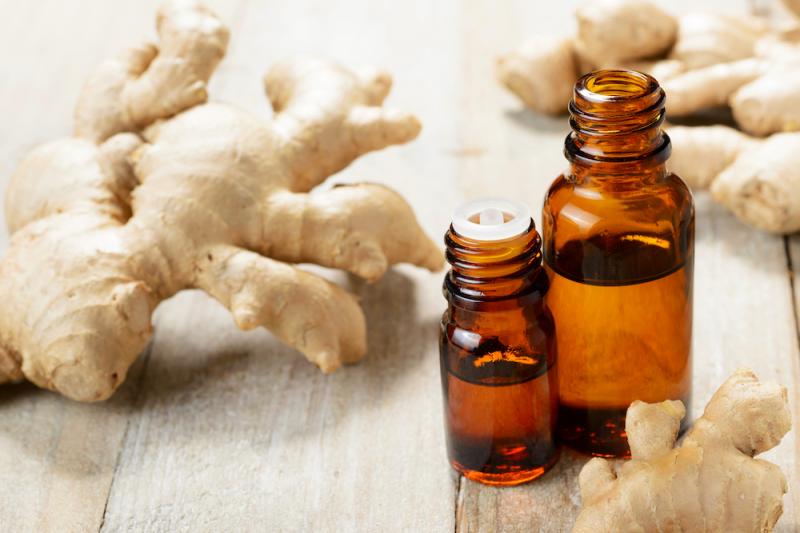
Ginger is a very common spice, it is available at any grocery store and is what flavors ginger snap cookies, gingerbread, and ginger ale. It’s a pungent herb, second only to capsicum in its stimulating effects, but has a more sweet and pleasant warmth, making it easier to take. But where capsicum primarily stimulates circulation, ginger’s primary action is directed towards the digestive system.
Ginger stimulates digestive secretions and increases intestinal motility. This means it helps food digest better and also helps relieve digestive stagnation, easing gas, bloating, and indigestion. Problems with intestinal motility can have many causes, but the use of opioid pain relievers is a common one. I experienced it when I took an opioid pain reliever after my gallbladder surgery. I quit taking it after for two days because I could tell it was causing digestive problems for me.
Ginger and Motion Sickness
 Daniel B. Mowrey, author of The Scientific Validation of Herbal Medicine, published a study on ginger for motion sickness and nausea in the medical journal The Lancet in 1982. He and his research partner found that when 2-4 capsules of ginger were taken prior to travel, and an additional two capsules were taken each hour while traveling, it was 90 percent effective in preventing motion sickness. He found that 3-8 capsules ingested prior to getting out of bed in the morning and 3-5 capsules during the day at the slightest sign of nausea were 70 percent effective in reducing or eliminating morning sickness.
Daniel B. Mowrey, author of The Scientific Validation of Herbal Medicine, published a study on ginger for motion sickness and nausea in the medical journal The Lancet in 1982. He and his research partner found that when 2-4 capsules of ginger were taken prior to travel, and an additional two capsules were taken each hour while traveling, it was 90 percent effective in preventing motion sickness. He found that 3-8 capsules ingested prior to getting out of bed in the morning and 3-5 capsules during the day at the slightest sign of nausea were 70 percent effective in reducing or eliminating morning sickness.
The ability of ginger to ease motion sickness and nausea is related to its digestive effects. As I understand it, nausea occurs when the peristaltic motion of the small intestines reverses. Normally it’s pushing material downward, but when it starts pushing things upward towards the stomach, you experience nausea. If this reversal of peristalsis persists you throw up. By stimulating the downward movement of materials in the small intestine, ginger eases the nausea and prevents the vomiting.
Ginger for Colds and Congestion
 I’ve found pungent herbs like capsicum, ginger, garlic, and mustard to be some of the best allies for acute ailments involving fever, chills, and copious watery or white mucus. You use herbs like ginger to thin and expel mucus and to induce perspiration. Drinking a warm tea made of either fresh or dried ginger is helpful. One popular remedy is a tea made with slices of fresh ginger, lemon, and a little honey.
I’ve found pungent herbs like capsicum, ginger, garlic, and mustard to be some of the best allies for acute ailments involving fever, chills, and copious watery or white mucus. You use herbs like ginger to thin and expel mucus and to induce perspiration. Drinking a warm tea made of either fresh or dried ginger is helpful. One popular remedy is a tea made with slices of fresh ginger, lemon, and a little honey.
It’s also helpful to use ginger in a bath. Put a couple of Tablespoons of dried ginger into a bag made with cheesecloth or other fabric and put it in a tub of water as hot as can be comfortably tolerated. Soak in the bath for at least 15 minutes, keeping the bath hot. It can be helpful to coat sensitive areas in some olive oil so they won’t be irritated by the ginger. Ginger baths can be helpful for easing both acute ailments and easing muscle aches and joint pain.
Using Ginger
 Ginger works well in capsules or tea form, but it can also be used in a variety of food-like forms. I’ve eaten pickled ginger or candied ginger and drunk ginger beer to help digestion. I’ve also juiced fresh ginger with lemon and apple to use as a digestive tonic.
Ginger works well in capsules or tea form, but it can also be used in a variety of food-like forms. I’ve eaten pickled ginger or candied ginger and drunk ginger beer to help digestion. I’ve also juiced fresh ginger with lemon and apple to use as a digestive tonic.
In Modern Herbal Dispensatory, I list a formula I created called ginger magic that I find great for fighting colds and flu and settling an upset stomach. It also has anti-inflammatory properties. To make it, start by juicing fresh ginger using a vegetable juicer. Measure the amount of ginger juice and add an equal amount of glycerin (or honey). Then add ¼ of that amount of brandy or spiced rum. So, if you added 1 cup of glycerin, you’d add ¼ cup of brandy. To use it take 1-3 teaspoons with water when you're sick or have an upset stomach.
Ginger essential oil can also be used, but it must be diluted. To use it internally dilute 1-2 drops in a little fixed oil (olive or coconut oil). Ginger oil can also be diluted in a fixed oil and applied topically to help ease joint and muscle pain.
I’ve read warnings that ginger should be avoided during pregnancy, but I don’t believe them. The medical profession doesn’t caution women against drinking ginger ale or eating candied ginger and the capsules have been used by many women to ease morning sickness. So I think ginger (in appropriate doses) is an extremely safe remedy for anyone except infants.
Steven's Articles
February
-

-
Reishi (Ganoderma) Mushroom
A TCM remedy for calming the shen (spirit), balancing…
-

-
Eucommia Bark
A superior tonic that promotes kidney, structural,…
January
-

-
Goldenthread, Phellodendron, and Yellow Root
Three herbal remedies containing the infection-fighting…
-

-
Teasel
A traditional herb for healing bones and joints…
-

-
Barberry and Healthy Personal Boundaries
A thorny shrub for fighting infections and supporting…
December
-

-
The Evidence for Berberine
A yellow alkaloid found in traditional infection-fighting…
-

-
The Sensible Use of Caffeinated Herbs
Kola nuts, guarana, and yerba mate and other herbs…
-

-
The Health Benefits and Problems with Coffee
This popular caffeinated beverage can be beneficial…
October
-

-
Understanding Caffeine & Cellular Adaptation
Preserving the power of caffeine's buzz and the…
September
-

-
Horseradish
A pungent spice for aiding protein metabolism…
-

-
Banaba or Crepe Myrtle
A beautiful tree from Southeast Asia whose leaves…
August
-

-
Monkeyflowers
Flower essences to help see ourselves more clearly…
-

-
Mariposa Lilies
Strengthening the bond between mother and child…
-

-
The Noble Bay Leaf
A common kitchen herb for aiding digestion and…
-

-
Epimedium: Horny Goat Weed
A circulatory stimulant and kidney yang tonic…

